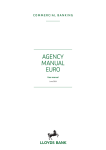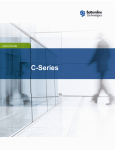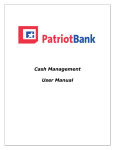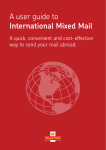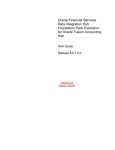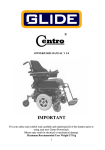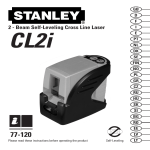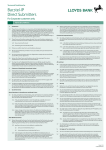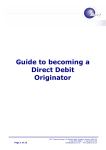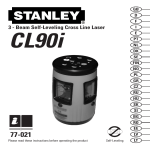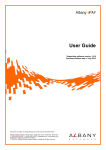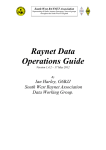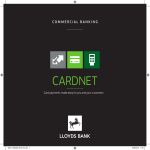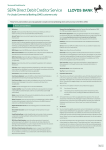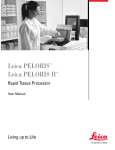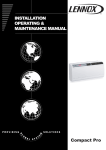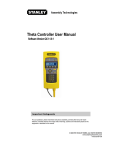Download AGENCY MANUAL STERLING
Transcript
AGENCY MANUAL STERLING User manual June 2014 Contents Introduction 4 The 2-4-6 and 2-6-6 changes 5 Chapter 1 – Remitting work to Lloyds Bank (outclearing) 6 Stationery 6 Cheques and Credits 6 Control Vouchers 6 Miscellaneous 6 Stationery Orders 6 Daily Routines 7 Processing the Cheques and Completing Your Daily Debit Remittance 7 Transaction Codes for Debits 7 Processing the Credits 7 Transaction Codes for Credit Remittance 7 Completing your Daily Credit Remittance 7 Checking the finished Remittances 8 Errors 8 Remittance Differences 8 A – Differences discovered by yourselves 8 B – Differences identified by iPSL 8 Missing Cheque(s)/Credit(s) not received by iPSL 8 Cheque(s)/credit(s) remitted by yourself but not listed within a remittance 9 Cheque(s)/credit(s) incorrectly listed 9 Non clearing items 9 Reconciliation 9 Missing Clearing Bags 9 Chapter 2 – Processing your In-Clearing 10 Routine Procedures 10 Debit Clearing 10 Paying Cheques 10 Automated Debit Clearing Listing 10 Credit Clearing 10 Credit Clearing Listing 10 Bureau Clearing 11 Special Procedures 11 Unpaid cheques 11 Unpaids Outwards 11 Legal Orders 12 Claim for Unpaid (manual claim)/Advice of Unpaid Item (Bacs) 12 Wrongly Delivered Items which have been listed and charged 12 Wrongly Delivered Items which have not been listed and charged 12 Uncrossed Returns 13 Missing Cheques to be returned Unpaid 13 Missing cheques to be returned for the reason‚ “Sight of Paper Required” 13 Non standard paper 14 Sight of Paper Required – Not Prepared to pay Against a Copy 14 Reversal of SOPR Decision 14 SOPR Thresholds 14 Outward Unpaids Cheques Received between T+4 and T+6 15 Outward Unpaids Cheques Received after T+6 15 Unpaid Inwards 15 Inward Unpaid Cheques received on T+3 15 Inward Unpaid Cheques Received between T+4 and T+6 15 Inward Unpaid Cheques Received after T+6 15 Non Receipt of Unpaid Cheques 15 Non Receipt of Clearing Debit Advice 16 Current Account Switch Service – Cheque Forwarding 16 Missing Clearings 16 Special Presentations 16 Stopped Cheques 17 Cheque Conversion Claim 17 Beneficiary claiming non receipt of funds 17 Returning Direct Debits 17 Clearing Adjustments – Debits and Credits 18 No Clearings or Wrong Clearings received 18 Clearing Adjustments 18 Debit Clearing Adjustments 18 Mis-sorted Items (Drawn on another bank/financial institution) 18 Errors in Automated Debit Clearing 18 Missing items (General) 19 Credit Clearing Adjustments 19 Clearing Adjustments – Bureau 19 Chapter 3 – Lloyds Bank Contact List 20 Chapter 4 – Example stationery, printouts and forms 22 Examples of stationery for remitting work 22 Examples of stationery for in clearing 22 Examples of stationery for special procedures 22 Examples of computer listings 22 Introduction Before you begin to use our Agency Service, it is vital that you understand how the service works and all that is required. As an Agency participant, you are expected to adhere to these standards and practices. Your Relationship Manager will be pleased to answer any questions you may have regarding these regulations. Therefore, please read this manual carefully and ensure that you are able to comply with the standards and practices, which are outlined. Lloyds Bank is a Settlement Member of various UK Industry Payments Schemes. For a full list of payment schemes, please visit the UK Payments Administration website at www.ukpayments.org.uk. Our interests are represented on all relevant committees and we also represent our customers (who are referred to as Agency Participants or Indirect Clearers). The Bank must also abide by all regulations and standards outlined by the industry bodies of the payment schemes. Throughout this manual, you will see that there are strict regulations which are governed by the Cheque and Credit Clearing Company (C&CCC) and other industry bodies. These include the issue of cheque books and the timescales for returning cheques, etc. As part of your day to day banking you will also be in regular contact with various specialised areas of Lloyds Bank and full contact details for these can be found in Chapter 3. Finally, Lloyds Bank is delighted to be working with you and is committed to helping ensure the successful operation of your Agency banking. Best regards Global Transaction Banking – Commercial Banking 4 of 23 The 2-4-6 and 2-6-6 changes Following a report published in 2007 by the Office of Fair Trading Payments Systems Task Force, all banks that provide cheque clearing services in the UK have had to change the way in which they handle cheques. Collecting Bank Day 0 (Mon) Cheque deposited Day 1 (Tues) Cheque processed Day 2 (Weds) Under this industry initiative various changes have been adopted by all banks to ensure that maximum timescales have been set for all component parts of the cheque clearing cycle. The components have been broken down into the ‘paying-in day’ plus 2, 4, or 6 working days (i.e.2-4-6): Paying Bank Cheque processed Cheque cleared for value1 or cheque returned unpaid (E+1) Day 3 (Thurs) Day 4 (Fri) Day 7+ (Tues) Collecting Bank Unpaid received & processed (E+2) Cheque cleared for fate2 Any cheques delayed during clearing and which are unpaid must be debited to the beneficiary, by the collecting bank by Day 7 (T+6). Failure to do so will lead to an operational loss, which will be incurred by the paying or collecting bank depending on where the delay has arisen. Notes Suspending the 2-4-6/-2-6-6 proposition 1. ‘value’ means the provision of credit interest or the reduction on payable debit interest; 2. ‘fate’ means the cheque is assumed cleared and the customer can draw funds against the cheque from any channel; Due to the manual nature of paper clearings, from time to time, items will be lost and/or delayed at various points during the process. The proposition can be suspended by debiting your customer’s account. Failure to debit your customer’s account before the close of business on T+6 may lead to an operational loss as you will not be able to debit their account without their express permission in the event that the cheque is subsequently unpaid. Customers have ‘certainty of fate’ if the cheque has not been debited back to their account by the close of business on T+6. The cheque is definitely cleared although there are exceptions relating to fraud if the customer him/herself is involved in the fraud. Throughout this manual we have made references to the need‚ “to consider debiting your customer” and in some instances we have asked you to contact us for advice. These changes apply to customers paying in UK Sterling cheques This advice may be to suspend the 2-4-6 proposition to issued by or deposited in to Sterling accounts with UK banks and protect both yourself and Lloyds Bank as your settlement building societies. The 2-4-6 changes have been implemented for bank, but if you decide not to do so (e.g. for customer experience reasons) any liability for losses will rest with you. Sterling current accounts and basic bank accounts whilst for UK Sterling savings accounts the maximum time limit for withdrawal is longer 6 days rather than 4 (i.e.2-6-6). Bank Holidays In determining whether an item has been returned after E+2 allowance needs to be made for Bank Holidays that may be in place in England, Isle of Man, Northern Ireland or Scotland in isolation. Such Bank Holidays do not impact the customer proposition. 5 of 23 Chapter 1 – Remitting work to Lloyds Bank (outclearing) This chapter includes most of the day-to-day routines and assist in overcoming problems that may be encountered with encoding and remitting work. You will appreciate that disruptions to our automated system can be very time consuming and could result in delayed clearance of your remittances. It is important to correctly present your remittances as the cheques and credits are automatically read and sorted using high-speed machinery. NOTE: If you have queries regarding your remittance, please telephone iPSL Customer Care (Helpdesk) available Monday to Friday from 8am to 5pm. Stationery Cheques and Credits All cheques and credits passed through the Inter-Bank clearing must be printed by an accredited printer that is a member of the Cheque Printer Accreditation Scheme (CPAS). This scheme was introduced with the aim of tackling fraud involving company cheques. Members of CPAS have stringent standards to meet the requirements for security, paper quality and layout. To ensure that your items meet this standard or if you require approval for new stationery, please contact the Cheque and Credit Approval Group. The following stationery items will be used in completing your remittance: Control Vouchers • Batch Tickets • Sub total vouchers • Remittance Docket Summary and Control Voucher • Credit Remittance Summary Please mark all Vouchers with details of your company/ bank title. Miscellaneous • Random Remittance Rubber Stamp • Branch Crossing Stamp Stationery Orders Customers are automatically supplied with an initial stock of stationery – for further supplies, please email [email protected] 6 of 23 Daily Routines Processing the Cheques and Completing Your Daily Transaction Codes for Debits Debit Remittance A full list can be obtained from your Relationship Manager. All cheques which are processed must meet CPAS standards for paper quality and must be encoded with FULL Code line details, including transaction code – see below. • Please check the payee’s name is stated on the cheque and is the same as the customer’s name on the account to which the cheque is being credited. • Remove all pins, staples, sprocket holes and other attachments from cheques, as these are all causes of rejects and machinery breakdowns and could result in late clearance of the cheque(s). • Place your crossing stamp on the front of each cheque. • Add List (on a duplicate tally roll) all cheques taking a Voucher (STV) at the back of the bundle. • When you get to the end of the final cheque bundle total the add listing (please do not include a STV at the back of the final cheque bundle). • Impress the‚ “Random Remittance Rubber Stamp” below the total on the listing, complete the relevant details within the area left by the stamp impression. • Complete a BGC with the total number of cheques, the date and the total value of the cheques. • Complete a Batch Ticket with today’s date. • Please note: Where the number of cheques exceeds 2,500, they should be separated into batches of 2,500 maximum, with a separate BGC and Batch ticket for each. • Complete the summary voucher (46R) with the date and total cheque value. • Bundle the entire remittance in the correct order with all vouchers present in accordance with the Bulk Cheque Preparation aide memoire. • Complete a red polylope with the date and your remitting details. • Place all items in the red polylope and securely seal the polylope. • Full code line data must be retained either by microfilming your work, or using another acceptable method which is available on the market. Cheque – item must be presented through the clearing 12 Bankers Payment/Managers Cheques 17 Direct Debit Processing the Credits All Bank Giro Credits being remitted must meet CPAS Standards for paper quality and layout, and must be encoded with a minimum codeline of Sort Code, amount and transaction code. • Ensure the front of all BGCs are clearly endorsed with your subtotal (NOT a total) after approximately 200–250 cheques. Please ensure that a duplicate tally roll is used as the bottom copy, which should be clearly legible, and must be retained for one year as an Audit Trail. • For each bundle of 200–250 cheques, include a Sub Total 10 crossing stamp. • Be sure to microfilm your credits, and check they are encoded with the relevant transaction codes as outlined below: Transaction Codes for Credit Remittance 73 Consumer Credit and Mail Order Credit 74 Consumer Credit and Mail Order Credit – Full Length Joint Giro 77 Own Account – Personal Credit 78 Own Account – Non-Personal Credit 91 Joint Giro Credit – short code line 98 Sundry Credit (to include Manual Standing Order Credits) Completing your Daily Credit Remittance Remove all pins, staples, sprocket holes and other attachments from bank giro credits (BGC’s) as these are all causes of rejects and machinery breakdowns and could result in late clearance of the credits. Place your crossing stamp on the front of each BGC. Add List (on a duplicate tally roll) the BGC’s taking a subtotal (NOT a total) after approximately 200–250 BGC’s. Please ensure that a duplicate tally roll is used as the bottom copy, which should be clearly legible, and must be retained for one year as an Audit Trail For each bundle of 200–250 BGC’s, include a Sub Total Voucher (STV) at the back of the bundle. • When you get to the end of the final BGC bundle total the add listing (please do not include a STV at the back of the final BGC bundle). • Complete one Banker’s Payment, or cheque, for the total of BGCs remitted. • Complete a Batch Ticket with today’s date. 7 of 23 • Please note: Where the number of batch giro credits exceeds 2,500, they should be separated into batches of 2,500 maximum, with a Bankers Payment or cheque and Batch ticket for each. • Complete the summary voucher (39R) with the date and total BGC value. • Bundle the entire remittance in the correct order with all Please take great care to ensure that alterations are correctly made and followed through to all lists and totals. If a summary form (46R or 39R) is incorrectly completed, destroy the form(s) and complete a new one. Remittance Differences For full contact details of Research & Adjustment, refer to entry B in chapter 3. vouchers present in accordance with the Credit Random Remittances Preparation aide memoire. • Complete a red polylope with the date and your A – Differences discovered by yourselves Please note remitting details. • Place all items in the red polylope and securely seal A difference of a remittance will only be investigated within 12 months. However, if an item has been encoded or listed incorrectly an adjustment can be made up to 6 years after the date of remittance. It is very rare for this to happen as customer would usually notify their bank if a cheque they have issued has been debited for the wrong amount. the polylope. • Full code line data must be retained either by microfilming your work, or using another acceptable method which is available on the market. Checking the finished Remittances Adjustments to clearing differences will be made to your Sterling bank account under advice. The following points should be checked before the cheques/ credits are submitted: • Any error in listing the cheques/credits has been spotted, and the listings have been amended correctly in accordance with the Errors section detailed below. • Ensure the following types of voucher are not included in • Error identified and proven Pass a correcting entry to your nominated Sterling bank account. You will need to supply full details of the error. • Error suspected but not proven the remittance: Obtain a computer print-out of all cheques/credits processed within your remittance from R&A. Manual for instructions on how to remit these). This print-out may then be checked back to your add listing in order to identify the error. • Euro denominated cheques (please see the Euro Agency • Club or shop cheques (these items should not be printed with details of a Clearing Bank). • Cheque(s)/Credit(s) listed within a remittance but not in a foreign currency. If a cheque/credit is found in your office, which should have been included in a previous remittance, please contact R&A for guidance on how/where to forward the item (see Entry B, Chapter 3). • Cheques issued/payable abroad or drawn included in the remittance • Postal and money orders. • Bills of Exchange. • Tax vouchers. • National Savings Banking form B6. • There are no staples, pins or attachments on the Items forwarded in this way may be subject to a delay in clearance. cheques/credits. • No cheques/credits are upside down, back to front, or folded in half. • Ensure the crossing stamp has been endorsed onto the face of each cheque/credit and is legible. • If the crossing stamp cannot be read, any cheque that has to be returned ‘unpaid’ may be subject to delay. • The remittances are correctly presented, in accordance with the Bulk Cheque and Credit Random Checklists. Errors If an error has been made in the listing of cheque/credits: • On both the top and bottom copies of the listing, the B – Differences identified by iPSL Missing Cheque(s)/Credit(s) not received by iPSL If a cheque/credit is listed in your remittance but not received by iPSL, you will be advised of the missing item and your account will be debited/credited with the value of the missing cheque/credit. • If payment is required against a photocopy of the item, or code line details, please complete a Lost Cheque Remittance Form and send it to R&A. • R&A will then endeavour to clear the item with the paying bank. • You must also consider debiting the beneficiary whilst R&A are attempting to obtain payment against the photocopy/ codeline details to suspend the 2-4-6 customer proposition. This is because despite the provision of a photocopy/code line details the paying bank/branch may refuse payment for a number of reasons i.e. refer to drawer, payment countermanded by order of drawer etc. incorrect amount should be underlined in red, and the correct amount indicated to one side. Deduct the incorrect amount from the listing and then add the correct amount. 8 of 23 Please note Missing Clearing Bags Unpaid cheques cannot be debited back to your customers account after close of business T+6 therefore failure to debit your customer in respect of the missing cheque may result in a loss to you if the paying bank/branch refuses payment against a photocopy or codeline details of the cheque. If, after contacting R&A, it is established that the bulk clearing did not arrive at iPSL then an investigation will be undertaken in conjunction with the courier. In the event that the bag can still not be located you will have to consider debiting your customer in order to suspend the 2-4-6 proposition. • R&A will advise you if this action is unsuccessful. If payment has not been obtained we suggest that you contact the beneficiary and advise them to obtain a duplicate cheque from the drawer or arrange for payment to be made by alternative means. • If payment has been obtained, the paying bank will either remit the Bank Giro Credit through the clearing or alternatively arrange to pass a credit to your account by an alternative method. Cheque(s)/credit(s) remitted by yourself but not listed within a remittance • You may be required to identify where and when a cheque/ credit was listed within a remittance. If the cheque/credit cannot be identified as listed in a previous remittance, a credit/debit will be passed to your Lloyds Bank Sterling account. If, after contacting Customer Care (Helpdesk), it is established that the bulk clearing still cannot be located you should escalate this incident direct with Lloyds Bank Financial Institutions by email at [email protected] advising them of the number of cheques that were included in the remittance and the total value of the clearings. They will liaise direct with iPSL on your behalf to agree the most suitable course of action to resolve the issue. Financial Institutions will contact you to advise the procedures that have been agreed and to discuss the next steps. Cheque(s)/credit(s) incorrectly listed • R&A will notify you of the wrongly listed cheque/credit and a correcting entry will be passed to your Lloyds Bank Sterling account in settlement. Non clearing items • Should you include an item that is not eligible to be remitted through the UK Clearing System, the value of the item will be debited/credited to your Lloyds Bank Sterling account, under advice. Additionally, the item will be returned to you for action by your bank/financial institution. Reconciliation • You will need to reconcile any account entries so that any cheques delivered through a bulk scheme (on T) have been credited to your Sterling account on T+2. If the entries do not reconcile on T+3 you should urgently contact R&A for advice as potentially the clearings may have been delayed. 9 of 23 Chapter 2 – Processing your In‑Clearing This chapter outlines the procedures which should be followed when processing work which Lloyds Bank receives through the Inter-Bank Clearing on your behalf. Your In-Clearing may consist of cheques, credits, bureau clearing listings, along with the relevant debit and credit clearings computer listings. Each day you will either collect your morning work from a local Lloyds Bank branch, or have it delivered to you in a designated polylope. Routine Procedures Debit Clearing a blank ISN column Paying Cheques ‘******’ in the Sort CD column, AND Automated Debit Clearing Listing a blank amount field • Part 2 – Individual cheques which in some instances may You will receive an Automated Debit Clearing Listing (ADC) each working day, together with the cheques contained on it. In addition to the Cheque Number, Account Number and Amount, the ADC also shows the following information: be either listed but not received (i.e missing cheques) or delivered‚ “loose in the bag” or‚ “free items”. • Part 3 – Contains cheques which have been ‘rejected’ • ISN – the identifying number placed on the back of the cheque by the collecting bank. There will be no ISN present on cheques collected by Lloyds Bank. • Sort CD – the Sort Code of the collecting bank and will be blank if the cheque was collected by Lloyds Bank. – i.e. it has not been possible to process them on the automated system. Part 3 may also contain some ‘over’ cheques as described in Part One above. The following action should be taken: NOTE: The information in these two fields can be useful if you need to identify the remitting bank but should not be relied upon as the primary source of that information. Always use the details contained in the crossing stamp on the front of the cheque if it is present. • Add-list all cheques over £1,000 in Part 1 of the ADC listing, using the amount in figures field of the cheque and NOT the encoded amount. This ensures that the collecting bank has correctly encoded/listed these items and that any errors are identified as quickly as possible. • DIN – an identifying number placed on the back of the • All cheques listed in Part Two and Part Three should be add- cheque as part of the Inclearing process. Items of £1,000 and over are marked with an‚ “*” beside the account number and there are totals at the bottom of each page for cheques under £1,000 and £1,000+. This may be useful if your internal procedures require use of further routines for higher value cheques, e.g. for security purposes. There are three parts to the listing: • Part 1 – Contains all cheques which have been processed by the automated systems in Clearings. Part 1 may also contain some cheques which have NOT been debited to your account. These are called ‘over’ cheques and have been received from the collecting bank without their accompanying clearing data. ‘Over’ cheques are not included in any totals and are identifiable by: listed in the manner described above. Paying Cheques Remember, to pay a cheque, you must hold a customer mandate to pay cheques written by them. If the mandate to pay is revoked by verbal or written warning/instruction, by customer’s instruction (stop, marital dispute, dissolution of partnership, etc.), or by compulsion of law (bankruptcy, Mareva injunction) you must not pay the cheque. To return cheques unpaid, see Unpaids Outwards. Credit Clearing Credit Clearing Listing You will receive a Credit Clearing Listing each day, together with the Bank Giro Credits shown on it, which are used to credit your customers’ accounts. 10 of 23 The Listing shows the following information: 09. Payment Prohibited by Legal Order AMOUNT – The value of the individual Bank Giro Credit 10. DIN – This is an identifying number placed on the back of the cheque as part of the Inclearing process. 11. Crossed by two Banks 12. ACC/REF NUM – The Account Number from the codeline of the BGC 14. PRIME – Contains all BGCs which have been processed successfully on the automated system. This clearing is given to you in the form of a computer listing. Special Procedures Unpaid cheques Unpaids Outwards Unpaid Cheques should be returned on T+2 (i.e. E+1) of the clearing cycle – i.e. the day you receive them in your debit clearing (day 0 being the day they were paid into the collecting bank). You must write the reason for return in red ink on the top left corner of the cheque and send it to the collecting bank. The unpaid cheque must be received by the collecting bank before 9.30am on the next business day. Please note you can decide on the method of returning an unpaid cheque (i.e. guaranteed next day delivery, private courier etc.) however if you elect to use 1st class post you may be exposed to a greater risk of loss should an unpaid be received late by the collecting bank. Account Closed 15. Not allocated REJECTS – Contains BGCs which have been rejected – i.e. it has not been possible to process them on the automated system. The bureau clearing consists of automated direct debit and direct credit items which are passed to your agency sorting code. These are routed through Bacs, unless the sender of a credit, or the beneficiary of a direct debit, also banks with Lloyds Bank, in which case an internal system is used. Drawer Deceased 13. Suspected Fraudulent/counterfeit Cheque discovered within the clearing cycle There are two parts to the listing: Bureau Clearing Payment Prevented – Insolvency Act Proceedings 16. No Account 17. Non Clearing Item 18. Post Dated 19. Out of Date 20. Words and Figures Differ 21. Alteration Requires Drawer’s Signature 22. Payee’s Discharge Required/Irregular 23. Cheque Incomplete 24. Cheque Drawn in Pencil 25. Mutilated Cheque 26. Refer to Drawer – Not Drawn in Accordance with Cheque Card Criteria 27. Signature Differs – Not Drawn in Accordance with Cheque Card Criteria 28. Payment Stopped – Not Drawn in Accordance with Cheque Card Criteria 29. Original Cheque Required (where a photocopy has been presented) 30. Missing Cheque – drawer refuses permission to debit 31. Missing Cheque – unable to obtain drawer’s permission to debit 32. Refer to Drawer – Insufficient Funds (used by banks in Scotland) The banking industry has agreed wording of acceptable reasons for return and these are shown below. 33. Refer to Drawer – Insufficient Funds – Please Represent (used by banks in Scotland) No other reason should be written on any cheque. 34. Advice of Drawing Required – Please Represent Reasons for return: 35. 01. Refer to drawer 36. Member internal use 02. Refer to drawer, please represent 37. 03. Effects Uncleared 38. Member internal use 04. Not signed in accordance with mandate 05. No Mandate 06. Payment stopped 07. Payment stopped – Theft Reported 39. Member internal use Sight of Paper Required (SOPR)* Prevented: Drawer’s Bank in insolvency or administration procedure 40. Account Switched 41. Account Switched Potential Stop 08. Payment stopped – Awaiting Confirmation – Please Represent 11 of 23 • Drawee/Paying Bank or branch sorting code number which *Sight of Paper Required (SOPR) is a returned cheque reason that can be invoked in certain circumstances when a cheque is delayed or goes missing in the clearing process in order to ensure that the paying banks position can be protected and the 2-4-6 proposition can be complied with. will be the address and sorting code encoded on the cheque. If the bank/branch returning the item is not the drawee/ Paying Bank this will be the sorting code of the returning bank/branch or Central Unpaids Unit. • Destination bank name and address and sorting The destination of the collecting bank should be taken from the crossing stamp, referring to the Sort Code Directory/ISCD as necessary. code number. • Drawer’s account number. • Amount. • Reason for Return (including whether the cheque is present Cheques being returned unpaid should always be returned on the date of receipt (i.e. the day they are listed in your debit clearing). or not). • The unpaid cheque must be received by the collecting bank Legal Orders before 9.30am on the next business day. Please note you In the event that a Legal Order has been signed and as a result can decide on the method of returning an unpaid cheque it becomes necessary to‚ “unpay” an item that had already (i.e. guaranteed next day delivery, private courier etc.) been paid, it will be possible to return an item up to 24 hours however if you elect to use 1st class post you may be exposed after the specified deadline. In this instance, Return Reason to a greater risk of loss should an unpaid be received late 09‚ “Payment Prohibited by Legal Order” must be used and by the collecting bank. the Collecting Bank must be telephoned as soon as possible to inform them of the situation. Take the first and last name of the Wrongly Delivered Items which have been listed and charged person at the Collecting Bank to whom you give the notification If you receive individual wrongly delivered items in your inward and write their full name on the back of the item to be returned. debit clearing that have been listed and charged, you should return the cheques to the Collecting Bank with the reason‚ Claim for Unpaid (manual claim)/Advice of Unpaid Item (Bacs) “Wrongly Delivered – No Account” using a Manual Claim for Form number 11029 – claim for unpaid (manual claim) should Unpaid Form (where you pass entries using the debit clearing) be used where you make claims through the debit clearing. or Advice of Unpaid form (where you pass entries using Bacs). The form for claims for unpaids (manual claim) is in two parts: You must write the reason for return in red ink on the top • 1. A copy which is passed through clearing and should therefore include the destination Sort Code and Transaction Code 13 in the encoding line. 2. A copy which is sent together with the cheque with the reason for return to the receiving Bank Branch or central processing centre (there is also a file copy which should be retained for your own records). Alternatively if you make claims via Bacs form number 11030 – advice of unpaid item (Bacs) should be used. The advice of unpaid (Bacs) consists of a copy which is sent together with the cheque bearing the reason for return to the receiving Bank Branch or central processing centre and a file copy to be retained for your own records. The following information should be included when completing a Claim for Unpaid (Manual Claim)/Advice of Unpaid (Bacs) • A separate advice must be used for each unpaid item and the following detail must be included. • Date of advice which should be the date the decision is made to return the item unpaid (i.e the day you receive the cheque in your debit clearing). left corner of the cheque and send it to the collecting bank. The unpaid cheque must be received by the collecting bank before 9.30am on the next business day. These cheques must be returned in a separate envelope clearly marked‚ “Wrongly Delivered Items” and be received by the collecting bank before 9.30am on the next business day. • Please note you can decide on the method of returning an unpaid cheque (i.e. guaranteed next day delivery, private courier etc.) however if you elect to use 1st class post you may be exposed to a greater risk of loss should an unpaid be received late by the collecting bank. Wrongly Delivered Items which have not been listed and charged If you receive individual wrongly delivered items in your inward debit clearing that have not been listed and charged, you should return the cheque to R&A using a covering compliment slip, confirming that no entries have been passed and the cheque was received in error. You must not pass any entries or raise any clearing adjustment forms. If you receive a batch of wrongly delivered cheques you should contact iPSL Customer Care (Helpdesk) for advice. 12 of 23 Uncrossed Returns As you will not have the original cheque (and therefore no crossing stamp details) you will need to refer to the Sort Code column on the automated debit clearing listing and forward the unpaid advice to the collecting bank default Sort Code, where the first two digits of the Sort Code are listed. If the crossing stamp of a cheque to be returned unpaid is absent or illegible, the cheque should be returned to the collecting banks default Sort Code on T+2 (i.e. the same day the cheque is received in your debit clearing). You will need to refer to the Sort Code column on the automated debit clearing listing and forward the unpaid advice and cheque to the collecting bank default Sort Code, where the first two digits of the Sort Code are listed. Click here to view Collecting bank Sort Codes and locations. In the event that this information is not clear or there is insufficient data, you should telephone R&A and provide them with full details of the cheque and DIN number (which can be found on the automated debit clearing listing). R&A will check their records and will advise you as to where the unpaid cheque should be sent. Please remember to look on the back of the returned cheque to see if a rear endorsement has been used which will enable you to ascertain the collecting bank Sort Code and thus return the cheque via normal procedures. The reason for dishonour must be annotated IN FULL, in red ink on the top left portion of the cheque. Form number 11029 – claim for unpaid (manual claim) should be used where you make claims through the debit clearing. Form number 11030 – advice of unpaid item (Bacs) should be used where you make claims via Bacs. You can decide on the method of returning an unpaid cheque (i.e. guaranteed next day delivery, private courier etc.) however if you elect to use 1st class post you may be exposed to a greater risk of loss should the unpaid be received late by the collecting bank. Please note: – the unpaid cheque must be received by the collecting banks default Sort Code before 9.30am on the next business day. Click here to view Collecting bank Sort Codes and locations. In the event that this information is not clear or there is insufficient data you should telephone R&A and provide them with full codeline details and DIN number (which can be found on the automated debit clearing listing). The helpdesk will check their records and will advise you as to where the unpaid cheque should be sent. You can decide on the method of returning an unpaid cheque (i.e. guaranteed next day delivery, private courier etc.) however if you elect to use 1st class post you may be exposed to a greater risk of loss should the unpaid be received late by the collecting bank. Please note: the advice of unpaid must be received by the collecting bank default Sort Code before 9.30am on the next business day. Missing cheques to be returned for the reason‚ “Sight of Paper Required” If having decided that the cheque would not be returned for any reason, and you are not in a position to pay the cheque without sight of the original cheque, you can return the cheque‚ “Sight of Paper Required”. In these circumstances a claim for missing unpaid (copy acceptable/not acceptable only) must be issued, even though the original cheque is missing. Form number 12363 – claim for missing unpaid (manual claim) should be used where you make claims through the debit clearing. Form number 12364 – advice of missing unpaid item (copy acceptable/not acceptable) should be used where you make claims via Bacs. When completing the claim for missing unpaid/advice of missing unpaid item (copy acceptable/not acceptable) you Missing cheques to be returned for the reason refer to drawer or should indicate as to whether you will consider paying the cheque against a copy (please note this is not confirmation payment stopped etc. that the copy of the cheque will be paid). If a cheque drawn on one of your customers is listed in your A separate advice must be used for each unpaid item and the debit clearings, but the original cheque is not received, you following detail must be included. must first make a decision, based on the codeline data, as to whether the cheque would be returned for any reason such as a • Date of advice which should be the date the decision is made stopped cheque, or refer to drawer etc. to return the item unpaid (i.e the date the cheque is listed in your debit clearing). In these circumstances a claim for unpaid must be issued, even Missing Cheques to be returned Unpaid • Drawee/Paying Bank or branch sorting code number which though the original cheque is missing. Form number 11029 – claim for unpaid (manual claim) should be used where you make claims through the debit clearing. Form number 11030 – advice of unpaid item should be used where you make claims via Bacs. will be the address and sorting code encoded on the cheque. If the bank/branch returning the item is not the drawee/ Paying Bank this will be the sorting code of the returning bank/branch or Central Unpaids Unit. 13 of 23 • Destination bank name and address and sorting If an ISN number is quoted on the debit clearing listing this should also be included when completing a claim for missing unpaid/advice of missing unpaid item (copy acceptable/not acceptable). code number. • Drawer’s account number. • Amount. • Reason for Return (including whether it is acceptable Please note: the advice of unpaid must be received by the collecting bank default Sort Code before 9.30am on the next business day. to the Paying Bank for a copy of the item to be presented. Where there is no indication it will be assumed that a copy is acceptable). • ISN number (details taken from the automated debit clearing listing). • DCV total and fixing (it is important these details are included on the advice/claim for unpaid where the serial number and account number of the missing item has not been listed on the automated debit clearing listing). As you will not have the original cheque (and therefore no crossing stamp details) you will need to refer to the Sort Code column on the automated debit clearing listing and forward the unpaid advice to the collecting bank default Sort Code, where the first two digits of the Sort Code are listed. Click here to view Collecting bank Sort Codes and locations. In the event that this information is not clear or there is insufficient data you should telephone the R&A Helpdesk and provide them with full codeline details of the cheque and DIN number (which can be found on the automated debit clearing listing). R&A will check their records and will advise you as to where the unpaid cheque should be sent. You can decide on the method of returning an unpaid cheque (i.e. guaranteed next day delivery, private courier etc.) however if you elect to use 1st class post you may be exposed to a greater risk of loss should the unpaid be received late by the collecting bank. Please note: the advice of unpaid must be received by the collecting bank default Sort Code before 9.30am on the next business day. You can decide on the method of returning an unpaid cheque (i.e. guaranteed next day delivery, private courier etc.) however if you elect to use 1st class post you may be exposed to a greater risk of loss should the unpaid be received late by the collecting bank. Sight of Paper Required – Not Prepared to pay Against a Copy If you are not prepared to debit your customer against a copy of the cheque, please ensure the‚ “copy not acceptable” box is crossed when issuing the claim for missing unpaid/advice of missing unpaid form. The collecting bank will, upon receipt treat this notification as a‚ “final answer”, debit their customer and send an advice to the beneficiary that the cheque has not been paid. The beneficiary will then need to contact the drawer to obtain payment. No action should be taken if the original cheque turns up at a later date. Reversal of SOPR Decision A Sight of Paper Required return decision cannot be reversed under any circumstances even if the original cheque turns up at a later date. This is because the collecting bank may decide not to pursue the option of trying to obtain payment against a photocopy of the cheque and there will be no way to trace where they have got to in their investigations. You must take no action until R&A present the copy to you for payment as passing additional entries, etc. will further confuse the position. Non standard paper SOPR Thresholds The use of‚ “non-standard paper” (i.e. cheques which have Before using the Sight of Paper Required return reason you may not been printed by an accredited printer) require more want to consider the following: manual intervention. It is therefore inevitable that there will • The majority of missing cheques will be‚ “in order” and would be increased numbers of cheques of this type that‚ “go missing” be paid on presentation. in the clearing system. You are therefore encouraged to issue • Your customer’s account will be debited with the amount of your customers with cheque books which have been printed the cheque on the original date of presentation. Using SOPR by an accredited printer who is a member of CPAS. will generate a credit to your customers account. The account If the missing cheque has been issued on non standard paper will then be debited a second time if you decide to pay the debit clearing listing will not include any code line data). against a photocopy of the cheque upon presentation. • Due to the manual nature of the process there will be delays In this event, you should contact R&A Helpdesk and provide them with the appropriate DIN number listed on the debit clearing listing which relates to the missing cheque. in the collecting bank obtaining a copy of the cheque and presenting it for payment. R&A will provide you with the DCV total, fixing and the collecting bank default Sort Code which should all be included when completing a claim for missing unpaid/advice of missing unpaid item (copy acceptable/not acceptable). • Using SOPR will create additional workloads. Bearing in mind these points you may want to consider setting an internal threshold under which the SOPR return reason will not be used. The amount will depend on your risk appetite as if it later transpires that there is a technical irregularity with the cheque then it will be too late to return the cheque unpaid. This‚ “operational loss” will have to be borne by you as you did not use the SOPR return cheque route. 14 of 23 Outward Unpaids Cheques Received between T+4 and T+6 If a Collecting Bank raises a notice that they have received an unpaid cheque between T+4 and T+6 they may telephone you directly or the R&A Disputes Team. Upon receipt of the call from the Collecting Bank you should immediately telephone the R&A Disputes Team with the cheque details and confirmation that you returned the cheque on E+1 (i.e. the day you received the cheque in your debit clearing). Alternatively, if the Collecting bank contacts the R&A Disputes Team direct they will advise you by telephone. holding bank and pass a manual Claim for Unpaid (if you make claims through the debit clearing) or Advice of Unpaid (Bacs) if you make claims via Bacs to the appropriate Sort Code The additional Information from Collecting Bank to Beneficiary Bank should be included on the Claim/Advice of Unpaid • Drawee branch sorting code number • Collecting Bank/branch reference • Name of account credited • Beneficiary Sort Code and account number where available • Date item paid in • Amount of credit If an irrecoverable loss occurs, the Collecting Bank will either contact you direct or the R&A Disputes Team. You should then liaise with the R&A Disputes Team and they will investigate and Inward Unpaid Cheques Received between T+4 and T+6 ascertain where the error occurred and liaise with the Collecting Upon receipt of an unpaid cheque advice fax from us, you must check that the return has been advised to you before the close Bank where appropriate. of business on T+6. If an unpaid cheque is returned and advised Outward Unpaids Cheques Received after T+6 to you between T+4 and T+6 you should debit your customer’s If a Collecting Bank issues a notice to the effect that they have account. However if by debiting your customer you feel there is received an unpaid cheque after T+6 they may telephone you the real possibility of a subsequent irrevocable loss then you will directly or the R&A Disputes Team. need to put the‚ "Paying Bank on notice”. NB – Notice must be raised by exception rather than the rule. You should liaise with the R&A Disputes Team and they will investigate and ascertain where the error occurred and liaise with the Collecting Bank where appropriate. Unpaid Inwards Inward Unpaid Cheques received on T+3 To put the paying bank on notice you should telephone the R&A Disputes Team within 2 working days and provide them with the cheque details, together with confirmation of T. Please also confirm this telephone call by faxing notification to R&A Disputes Team. They will then contact the Paying Bank and raise the notice with them. Cheques which have been remitted to iPSL using one of our If an irrecoverable loss occurs, you should contact the R&A Bulk Cheque Schemes and crossed by you will be returned by the paying bank directly to iPSL Bulk Centralised Unpaids (BCU). Disputes Team again and they will investigate to ascertain • BCU will fax a copy of the unpaid cheque and telephone you where the error occurred and liaise with the Paying Bank to obtain reimbursement. As disputes have to be notified by T+16 to confirm receipt of the fax notification. Bank will require your instructions by T+13 in order to • Upon receipt of the fax notification you should immediately Lloyds allow us sufficient time to undertake the investigation. A claim pass a debit to the beneficiary’s account. can only be made if the Paying Bank has been put on notice. • BCU will submit a manual claim for unpaid to your agency Inward Unpaid Cheques Received after T+6 Sort Code through the Automated Debit Clearing (paper Upon receipt of an unpaid cheque advice fax from us, you must clearing) and return the original cheque to you. • Timescales can be delayed if the crossing stamp on the item check that the return has been advised to you before the close of business on T+6. If the unpaid is outside these timescales is unclear or omitted. you cannot pass the debit to your customer’s account without Cheques which have been paid in over Lloyds Bank Counters their permission. will be returned by the paying bank direct to Lloyds Bank You should immediately telephone the R&A Disputes Team Centralised Returns Inwards Unit (CRI). the cheque details, together with confirmation of T. • CRI will fax a copy of the unpaid cheque and telephone you with Please also confirm this telephone call by faxing notification to to confirm receipt of the fax notification. 0845 300 2580. They will then investigate to ascertain where • Upon receipt of the fax notification you should immediately the delay has occurred and liaise with the Paying Bank on pass a debit to the beneficiary’s account. your behalf. • A debit will be passed to your account and the original Non Receipt of Unpaid Cheques cheque will be returned to you. If a debit claim for unpaid (or a Bacs debit) is received for which NOTE: If the beneficiary account of the cheque returned to you you have not received a corresponding unpaid cheque, you will is held by another bank/financial institution, then telephone need to contact the originator of the debit immediately. They advice of the return must be given to that bank as early as will supply you with information which should enable you to possible to enable a debit to be passed to the beneficiary’s debit the payee for the amount unpaid. account within the timescales to suspend the 2-4-6 proposition. Request the name of the recipient of the call, and record it in case of future discrepancy. Return the cheque to the account 15 of 23 If you do not subsequently receive the cheque, the debit should be passed to the beneficiary’s account and a duplicate cheque obtained. If you are unable to apply a Manual Claim for Unpaid from the information given, you should refer back to the originator but the Manual Claim for Unpaid should not, itself, be returned unpaid. Missing Clearings In the event that an entire clearing is not delivered you will need to contact iPSL Customer Care (Helpdesk) and they will attempt to locate your clearings. If necessary they will arrange for a copy of your automated debit clearing listing to be faxed to you. Using the automated debit clearing listing you will need to issue an advice of unpaid cheque form where you know that a cheque will not be paid, for example where the cheque has been stopped or there are insufficient funds to debit the drawer’s account. Non Receipt of Clearing Debit Advice If the debit claim for unpaid (or Bacs debit) has not been received within 3 working days after receipt of the Unpaid Cheque, the returning bank/financial institution must be contacted. Current Account Switch Service – Cheque Forwarding • One of the key principles of the Industry Account Switch Scheme is that following the transfer of the account from the “Old Bank” (OB) to the “New Bank” (NB) any cheques drawn on the customers OB account will be presented to the NB for a pay/no pay decision. This process is manual due to the nature of cheque processing. The redirection service will remain in place for 13 months after the account switch. Any cheque presented to the OB after 13 months will be returned for the reason “Account Closed”. Changes to the Cheque Clearing Scheme • The Cheque Clearing Scheme has introduced a new element as part of the Cheque clearing process which will present cheques to the New Bank for a pay/no pay decision. Cheques which have been deposited in to the clearing scheme will be processed and presented to the Old Bank following existing processes. However as the account has switched these will be returned unpaid to the collecting settlement bank using new return reason codes “Account Switched” or “Account Switched-Potential Stop”. In these circumstances claim for unpaid forms must be issued, even though the original cheques are missing in accordance with the procedures detailed under the Unpaid Cheques headings: • Missing cheques to be returned for the reason refer to drawer or payment stopped etc. • Missing cheques to be returned for the reason‚ “Sight of Paper Required”. • Non standard paper. You can decide on the method of returning an unpaid cheque (i.e. guaranteed next day delivery, private courier etc.) however if you elect to use 1st class post you may be exposed to a greater risk of loss should the unpaid be received late by the collecting bank. Please note: the advice of unpaid must be received by the collecting bank default Sort Code before 9.30am on the next business day. Please note: • T+3 – LBG will provide details of the unpaid cheque to you The use of threshold limits will be particularly relevant when a large number of cheques or an entire clearing is not delivered to you for whatever reason. In these exceptional circumstances you may decide to return cheques one day late (as the collecting bank can debit their customer up to close of business T+6). However in the event that the collecting bank is unable to debit their customer or the funds become‚ “unrecoverable” the liability will remain with you. • T+3 – Upon receipt of the fax you must debit your customer Before issuing a large number or SOPR advices please contact the R&A Disputes Team for further guidance. • These cheques will then be presented by the collecting settlement bank to the new bank using a new memo process and the New bank will need to make a pay/no pay decision. following the same process as occurs today. to suspend 2-4-6 in accordance with cheque processing rules. (NB LBG will not pass any entries to your account at this stage). Special Presentations • T+3 / “Reset” T+0 – LBG will extract any cheques that have been returned account switched and as long as the OB has provided the NB details we will present the cheque for a pay/ no pay decision to the NB using a new “memo” process. T will be reset to “0”. • T+3 / “Reset” T+0 – To align this reset memo process to reset 2-4-6 you must re-credit your customer’s account. (NB LBG will not pass any entries to your account at this stage). • Reset T+2 / T+3 – NB will make a pay/no pay decision. If paid no further action is required. If the cheque is not paid the paying bank will return the cheque to LBG. • Reset T+3 – We will advise you of the unpaid cheque and debit your account following the same BAU process for Inward Unpaid Cheques received on T+3. You may be asked by another bank to determine fate on an item drawn on a customer of yours as a Special Presentation (or Direct Remittance). In this case, you will receive items directly from the presenting bank, and you will need to have procedures in place to handle such items accordance with the Cheque and Credit Clearing Company Special Direct Presentation Procedures. When presented by post, the cheque must be accompanied by a form incorporating a tear off bank giro credit slip. For amounts less than £500,000, settlement is through the Credit Clearing using the bank giro credit slip attached to the presentation form, alternatively Bacs or CHAPS may be used. For amounts of £500,000 or more, settlement is made via CHAPS. The CHAPS payment should be made on the day of presentation. 16 of 23 As a safeguard against fraud, the CHAPS message field should indicate that the payment is in settlement of a special presentation and quote any reference number which has been allocated by the Collecting Bank. The names of the drawer or payee of the cheque should not be quoted. The remitter’s name will be that of the Paying Bank and the beneficiary’s name that of an internal account at the Collecting Bank. Returning Direct Debits If a direct debit needs to be returned, you will need to generate an Automated Return of Unpaid Direct Debit (ARUDD) via the Bacs Payment Services website. For detailed information on the procedures that need to be followed, please refer to the following Bacs User Guides: • A Services Member and Agency Guide. When presented with a cheque for special presentation, you Payment Bank Guide and Rules to the Direct Debit Scheme. must give advice of fate over the telephone, and give your name • to the recipient/requesting bank. Once fate has been advised in (Please note: to obtain access to the Bacs reference user this way, this is final and cannot subsequently be reversed. guides, please click here.) Additionally, you will need to develop a form for making your own Special Presentations. Click here to view a sample of Lloyds Bank’s form for making Special Presentations (form number 11023 entitled ‘Direct Remittance’). Stopped Cheques Stopped Cheques must be returned on day of presentation, with an answer advised in full, not abbreviated. To accept a stop payment from a customer, you must have a written request (a telephone call can be accepted, however it must be followed up by written confirmation). Cheque Conversion Claim Beneficiary claiming non receipt of funds In the event that a customer contacts you advising that their account has been debited in respect of a cheque for which the beneficiary is claiming non receipt of funds you should contact R&A requesting that they put a ‚ “trace” on the item. To enable R&A to investigate they will require a clear photocopy (front and back of the cheque) with details of where the cheque was listed in your debit clearings including the date and total of the clearings. R&A will contact the collecting bank to establish if the correct beneficiary has been credited with the proceeds. If the collecting bank advises they have credited the wrong account in error they should pass correcting entries and advise R&A of their actions. R&A will advise you once they receive confirmation that correcting entries have been passed by the collecting bank. If it transpires the cheque is a‚ “potential” cheque conversion you will need to contact the collecting banks branch direct in writing stating that you believe the item which was deposited at their branch counters has been converted, and you require immediate reimbursement of funds. Clear copies (front and back) of the paid cheque should accompany the claim to the collecting bank. 17 of 23 Clearing Adjustments – Debits and Credits No Clearings or Wrong Clearings received If you receive the morning work of another agency customer, or do not receive any work at all, please contact Customer Care (Helpdesk) immediately. Clearing Adjustments Care: – Missing cheques must be processed using the Sight of Paper Required (SOPR) process. If a cheque/bank giro credit is not listed, wrongly listed/ encoded you will need to complete a clearing adjustment form. Remember to use a separate form is to be used for each adjustment. for clearing adjustments which relate to your Inward Credit Clearings. Examples of the forms can be viewed by clicking on the following hyperlinks: Form number 12385 Credit Clearing Adjustment Form – (IBD) Form number 12386 Debit Clearing Adjustment Form – (BGC) Form number 12388 Please refer to: Wrongly Delivered Items which have been listed and charged What should I do with my completed form? Step 1 Fax a copy of your form, listing, the front and back of your cheque or bank giro credit to R&A on: 01604 665477/665050 Step 2 Send an original copy of your form (without detaching the IBD/BGC), listing, the front and back of your cheque or bank giro credit to Research & Adjustment (R&A) at: Lloyds Bank plc Research & Adjustment iPSL Blaise Pascal House 100 Pavilion Drive Brackmills Industrial Estate Northampton NN4 7YP • Not listed on the automated debit clearing listing Please refer to: Wrongly Delivered Items which have not been listed and charged Errors in Automated Debit Clearing • Cheque incorrectly listed In each case the adjustment form should be completed with full details of the adjustment (including your Sort Code and account number details in the bank giro credit or inter branch debit section). Failure to include these details will result in the form being returned to you with no entries passed. Please note Mis-sorted Items (Drawn on another bank/financial institution). • Listed on the Automated Debit Clearing Listing clearing adjustments relating to your Inward Debit Clearings. Examples of the forms can be viewed by clicking on the following hyperlinks: Form number 12387 Care: – Missing cheques must be processed using the Sight of Paper Required (SOPR) process . Debit Clearing Adjustments • The Debit Clearing Adjustment Forms should be used for Debit Clearing Adjustment Form – (IBD) Please note that a clearing adjustment form can only be used for clearing adjustments and NOT for missing cheques. It is important that you use the correct form for adjustments. All differences, errors, problems, etc. must be dealt with on an immediate Urgent basis, as delays can adversely affect your success of achieving reimbursement of funds, reconciliation and agreement of your clearings. • The Credit Clearing Adjustment Forms should be used Credit Clearing Adjustment Form – (BGC) Once R&A receive your form they will work the case, process the adjustment and send the BGC/IBD in the appropriate clearing to your Sort Code and account number. You should debit the customer’s account with the correct amount and complete a Clearing Adjustment form (either 12387 or 12388 depending on whether you require a debit or credit to be passed to your account) with full details of the adjustment. A clear photocopy of both sides of the ‘offending’ item should be stapled to the top portion of the form with a copy of the Automated Debit Clearing Listing and the procedures listed under the heading Clearing Adjustments in the opposite column should be followed. Before despatch, fax a copy of the clearing adjustment form, cheque (front and back) and the debit clearing listing to R&A. • Cheque is received but not listed You should debit the customer’s account and issue Clearing Adjustment Form 12387. The form should be completed with as much detail as possible and sent by direct post together with a clear photocopy of the item (front and back) to R&A. Before despatch fax a copy of the clearing adjustment form, cheque (front and back) to R&A. Should the item(s) be for another bank you should contact R&A immediately. 18 of 23 Missing items (General) If the credit is payable to another bank/financial institution, forward the BGC to R&A with a brief note detailing when and how it was received. Retain a photocopy of the item with the day’s work. If a photocopy of a cheque is available, it should be debited to your customer’s account without their authority (This is standard Inter Bank practice, and we would expect, in all but extremely unusual circumstances, for you to adhere to this practice). • Bank Giro Credit(s) listed incorrectly Credit the correct value to the beneficiary account and submit If codeline details only are available it is also standard Inter Bank a correcting Clearing Adjustment Form (either 12385 or 12386 depending on whether you require a debit or credit to be practice that you would pay the cheques. passed to your account) with full details of the adjustment. If you choose not to pay the cheque for any reason, A clear photocopy of the ‘offending’ item (front and back) with you must follow the procedures listed under the heading a copy of the Credit Clearing listing should be stapled to the top Unpaids Outwards. portion of the form. • Missing Items (with full codeline details available in the Before despatch fax a copy of the clearing adjustment form, Day’s Work) bank giro credit (front and back) and a copy of the listing to R&A. Debit customer if customer is identifiable • Items that cannot be applied If customer is unidentifiable, you will need to follow the procedures listed under the heading‚ Missing Cheques to be returned for the reason‚ “Sight of Paper Required”. Please note: When completing the claim for missing unpaid (copy acceptable/not acceptable only) form please ensure the‚ “No account” and‚ “Copy not acceptable” boxes are crossed. • Missing Items (Required to be returned unpaid) Contact the remitting bank/financial institution requesting further details. If the remitter’s endorsement is illegible or missing, write to R&A requesting this information. R&A will require the work date, total value of the clearing and amounts of the two BGCs either side of the unapplied BGC on your listing. • Listed to you in error You will need to follow the procedures listed under the heading Unpaids Outwards. Please forward the item to the correct destination with a covering letter and payment. Retain a photocopy of the item with the day’s work. Please note Clearing Adjustments – Bureau Should the cheque subsequently arrive at your Branch, no action is required as you would have previously debited the collecting bank by following the procedure‚ “Missing cheques to be returned unpaid etc.” Credit Clearing Adjustments • Credit(s) listed but not received • Unpaid/Unapplied Direct Debits If a direct debit needs to be returned, you will need to generate an Automated Return of Unpaid Direct Debit (ARUDD) via the Bacs Payment Services website. For detailed information on the procedures that need to be followed, please refer to the following Bacs User Guides: –– A Services Member and Agency Guide. If you require a copy of the bank giro credit, write to R&A, to arrange the supply of a photocopy of the original BGC. –– Payment Bank Guide and Rules to the Direct Debit Scheme. (Please note: to obtain access to the Bacs reference user guides, please click here.) The following information will be required: –– Work date. • Credited in error –– Total value of the clearing. –– Amounts of the two BGCs either side of the missing BGC on the list. • Bank Giro Credit received but not listed If the credit(s) is payable to yourselves you should credit the customer’s account and iissue Clearing Adjustment Form 12385. The form should be completed with as much detail as possible and sent by direct post together with a clear photocopy of the item (front and back) to R&A. Before despatch fax a copy of the clearing adjustment form and bank giro credit (front and back) to R&A. If a credit cannot be applied you will need to generate an Automated Return of Unapplied Credit (ARUCS) via the Bacs Payment Services website. For detailed information on the procedures you need to follow, please refer to the Bacs A Services Member and Agency Guide. (Please note: to obtain access to the Bacs reference user guide, please click here.) • Overall amount of debit/credit incorrect Contact STP Bureau direct. 19 of 23 Chapter 3 – Lloyds Bank Contact List Please note: Lloyds Bank has outsourced ‘paper clearings’ to iPSL: iPSL 11A Northfield Drive Northfield Milton Keynes MK15 0DQ Missing Work – Agency BACS Service Agency Cheque Services A Non delivery of any one/all/combination of the following daily deliverables: Paper Debit Clearing Valid (Prime) items Paper Debit Clearing Manual (Reject) items Paper Debit Clearing Listing Paper Credit Clearing Valid (Prime) items Paper Credit Clearing Manual (Reject) items Paper Credit Clearing Listing Bureau Clearing Listing Agency Services Media Paper Clearing Accounting Enquiries B Phone: Customer Care (Helpdesk) on 01582 646123 / 01582 646124 / 01582 646125 General Paper Debit or Credit Clearing accounting enquiries (including incorrectly listed items, missing items and items not listed) Lloyds Bank Plc Research & Adjustment IPSL Blaise Pascal House 100 Pavilion Drive Brackmills Industrial Estate Northampton NN4 7YP Phone: Research & Adjustment on Bureau Clearing Accounting Enquiries C 0845 165 0414 Fax – 01604 665050 / 665477 Phone: STP Bureau (Formerly Bureau Clearing) Global Payments Reconciliations 5th Floor 2 Brindleyplace Birmingham B1 2AB 0121 625 5924 20 of 23 Cheque and Credit Slip Approval and Testing Bacs Enquiries R&A Disputes Team iPSL Bulk Centralised Unpaids D E F G Phone: Cheque and Credit Approval Group on 0151 210 4114 Cheque and Credit Approval Group iPSL 1st Floor Operations Bridle Road Bootle Merseyside L30 4AA Phone: Bacs Unit as follows: BACSTEL-IP and BACS Referrals on 0870 9025210 Direct Debits & Correspondence on 0870 9002066 Lloyds Bank Plc BACS Unit PO Box 72 Bailey Drive Gillingham, Kent ME8 0LS Phone: 01604 665474 Fax: 01604 665421 R&A Disputes Team Blaise Pascal House 100 Pavilion Drive Brackmills Industrial Estate Northampton NN4 7YP Phone: 01582 646162 Fax: 01582 646221 Bulk Centralised Upaids iPSL 11A Northfield Drive Northfield Milton Keynes MK15 0DQ 21 of 23 Chapter 4 – Example stationery, printouts and forms Examples of stationery for in clearing On the following pages are examples of stationery referred to in this manual. Lloyds Bank must vet all forms and stationery, which you use, before you use them. Before you have paying in books, cheque books, or forms printed, please contact the Cheque and Credit Approval Group for help and advice. • 11023 – Direct Remittance • Direct Debit Scheme Refund Request • Direct Debit Scheme Indemnity Claim (please note these should only be used in accordance with the Paying Bank Guide and Rules to the Direct Debit Scheme – submission of paper forms – exceptions process) If you are opening a new Agency, the Sort Code will not be put in operation until your stationery has been approved by the Cheque and Credit Approval Group. • Direct Debit Scheme Request for copy of AUDDIS Direct Examples of stationery for remitting work Examples of stationery for special procedures Please click on the following hyperlinks for example of stationery: Debit Instruction • 12385 Credit clearing adjustment – (BGC) • 12386 Credit clearing adjustment – (IBD) • 12387 Debit clearing adjustment – (IBD) • 12388 Debit clearing adjustment – (BGC) • Lost Cheque Remittance form – (CDB301) • 39R – Docket Control Voucher Summary (Random Credits) • Bulk Batch Ticket • 46R – Docket Control Voucher Summary (Debits) • Lloyds Bank STV (Sub Total Voucher) Examples of computer listings • 11029 – Claim for unpaid • 11030 – Advice of unpaid item (only to be used when passing • Credit Clearing Listing • Automated Debit Clearing Listing the entry by Bacs) • 12363 – Claim for missing unpaid item (copy acceptable/not • Bureau Clearing Listing acceptable only) • 12364 Advice of missing unpaid item (copy acceptable/not acceptable only) – (only to be used when passing the entry by Bacs) 22 of 23 For more information • isit V lloydsbank.com/commercialbanking • Contact your relationship manager Please contact us if you’d like this information in an alternative format such as Braille, large print or audio. If you have a hearing or speech impairment you can use Text Relay (previously Typetalk). Important information Lloyds Bank plc. Registered Office: 25 Gresham Street, London EC2V 7HN. Registered in England and Wales No. 2065. Telephone: 020 7626 1500. Authorised by the Prudential Regulation Authority and regulated by the Financial Conduct Authority and the Prudential Regulation Authority. Lloyds Bank International Limited: P.O. Box 160, 25 New Street, St Helier, Jersey JE4 8RG. Registered in Jersey, No. 4029. Regulated by the Jersey Financial Services Commission to carry on deposit taking business under the Banking Business (Jersey) Law 1991, and investment and general insurance mediation business under the Financial Services (Jersey) Law 1998. The Isle of Man branch of Lloyds Bank International Limited is licensed by the Financial Supervision Commission to conduct banking and investment business, and is registered with the Insurance and Pensions authority in respect of General Business. The Guernsey branch of Lloyds Bank International Limited is licensed to conduct banking, investment and insurance business by the Guernsey Financial Services Commission under the Banking Supervision (Bailiwick of Guernsey) Law 1994, the Protection of Investors (Bailiwick of Guernsey) Law 1987 and the Insurance Managers and Insurance Intermediaries (Bailiwick of Guernsey) Law 2002. PM0744 (07/14)























